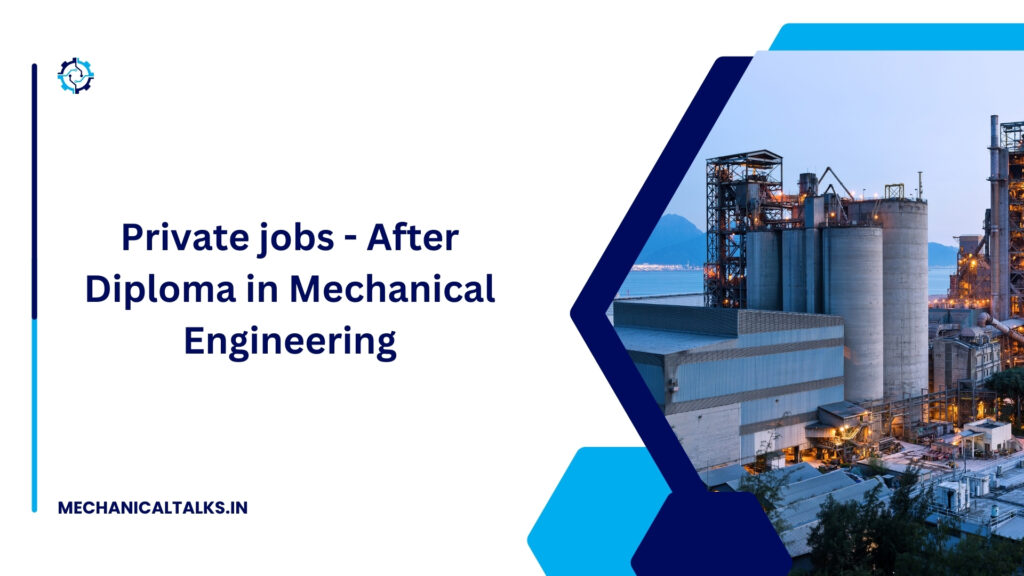Congratulations on completing your diploma in Mechanical Engineering. As you step into the dynamic world of engineering, you might be wondering, ‘What’s next?’
Fear not, for article is here to guide you through the exciting avenues that await you after your diploma. Whether you’re eager to dive straight into the workforce or considering further education options, we’ve got you covered.
The world of mechanical engineering is full of possibility. Your diploma has opened doors to a wide range of jobs in various industries.
Let’s explore the myriad opportunities and career pathways that lie ahead for mechanical engineering graduates like you.
Further Education Options after Diploma in Mechanical Engineering
Table of Contents
Bachelor’s Degree in Engineering Field
This is the most popular option for diploma holders. Many universities and colleges offer Bachelor of Technology (B.Tech) or Bachelor of Engineering (B.E.) degrees in mechanical engineering with a lateral entry option for diploma students. This allows you to enter the program directly into the second year, saving you time and money.
It is not necessary that you do only B.Tech or BE in Mechanical Engineering, you can also change your stream if you want. For Example –
Aerospace Engineering
This field deals with the design, development, testing, and operation of vehicles that travel through the air and space. It has two main branches: aeronautical engineering focused on aircraft within Earth’s atmosphere, and astronautical engineering focused on spacecraft. Think airplanes, rockets, satellites, and more
Computer Science Engineering
This branch applies computer science principles to design, develop, and implement software systems. It involves creating algorithms, programming languages, databases, and networks. Essentially, it’s the foundation for all things computers
Automobile Engineering
This focuses on the design, development, manufacturing, and operation of automobiles, motorcycles, trucks, and other vehicles. It involves mechanical, electrical, and software engineering to create efficient, safe, and comfortable transportation.
Civil Engineering
This deals with the design, construction, and maintenance of physical infrastructure. Civil engineers plan and build bridges, dams, buildings, roads, water treatment systems, and other structures that impact our everyday lives.
Industrial Engineering
This combines engineering principles with mathematics and optimization techniques to improve processes, systems, and organizations. Industrial engineers focus on efficiency, productivity, and quality control in various industries like manufacturing, healthcare, and logistics.
You can change your stream to choose your interest or career. You can do B.Tech or BE from any stream.
Benefits of a Bachelor’s Degree:
- Opens doors to a wider range of job opportunities and higher salaries.
- Provides a more in-depth understanding of engineering principles.
- Qualifies you for professional engineering licensure in some jurisdictions.
Diploma/Certificate in a Specialized Area
Computer-Aided Design (CAD): This certificate focuses on mastering CAD software such as AutoCAD, SolidWorks, or CATIA, which are widely used in the mechanical engineering industry for designing and drafting purposes.
Certificate programs in CAD typically range from 6 months to 1 year in duration, depending on the institution and level of depth covered in the curriculum.CNC Programming and Machining: This certificate program trains you in computer numerical control (CNC) programming and machining techniques, which are essential skills for working in manufacturing and machining industries. Certificate programs in CNC programming and machining usually last between 6 months to 1 year, including both theoretical knowledge and practical training.
Quality Control and Assurance: This certificate program covers principles and practices related to quality control and assurance in manufacturing processes, including topics such as statistical process control (SPC), Six Sigma, and ISO standards. Certificate programs in quality control and assurance typically last around 6 months to 1 year, covering topics such as statistical methods, quality management systems, and inspection techniques.
HVAC (Heating, Ventilation, and Air Conditioning) Systems: This certificate focuses on designing, installing, and maintaining HVAC systems, which are crucial in buildings, industrial facilities, and transportation vehicles. Certificate programs in HVAC systems typically range from 6 months to 1 year in duration, covering the design, installation, and maintenance aspects of HVAC systems.
Welding Technology: This certificate program provides hands-on training in various welding processes and techniques, preparing you for careers in welding and fabrication industries. Certificate programs in welding technology can vary in duration, but they generally last between 6 months to 1 year, providing comprehensive training in various welding processes and techniques.
Renewable Energy Systems: This certificate program covers renewable energy technologies such as solar, wind, and hydroelectric power, along with their applications in mechanical engineering projects. Certificate programs in renewable energy systems usually last around 6 months to 1 year, covering renewable energy technologies and their applications in mechanical engineering projects.
Robotics and Automation: This certificate program delves into the field of robotics and automation, covering topics such as robotic programming, sensors, actuators, and industrial automation systems. Certificate programs in robotics and automation typically range from 6 months to 1 year in duration, focusing on robotic programming, automation systems, and industrial applications.
These are just a few examples of specialized certificate programs available to diploma holders in mechanical engineering. Depending on your interests and career goals, you can choose the most suitable certificate program to complement your diploma and expand your knowledge and expertise in specific areas of mechanical engineering. and please keep in mind that the duration may vary depending on factors such as the institution offering the program, the format (full-time or part-time), and the specific curriculum requirements. It’s essential to research and compare different certificate programs to find the one that best fits your schedule and career objectives.
Jobs Option After Diploma in Mechanical Engineering
Whatever jobs are mentioned will be for India. All job options will be for Indians
Government Jobs for Mechanical Engineers (After Diploma)

Central Government Jobs – After Diploma in Mechanical Engineering
Public Sector Undertakings (PSUs): Many PSUs like Bharat Heavy Electricals Limited (BHEL), Steel Authority of India (SAIL), Gas Authority of India Limited (GAIL) etc., recruit diploma holders for various positions like Junior Engineer and Technician.
ISRO (Indian Space Research Organisation): ISRO offers opportunities for diploma holders as Technical Assistants.
DRDO (Defence Research and Development Organisation): DRDO also recruits diploma holders for technical positions.
AFCAT (Air Force Common Admission Test): Through AFCAT, you can apply for technical branches in the Indian Air Force.
Railway Jobs: Railway Recruitment Boards (RRBs): RRBs conduct exams for various technical positions like Junior Engineer in the Indian Railways.
State Government Jobs – After Diploma in Mechanical Engineering
State Public Service Commissions (SPSCs): Various state SPSCs conduct exams for positions like Junior Engineer, Assistant Engineer in departments like Public Works Department (PWD), Irrigation Department, State Electricity Boards etc.
State Transport Corporations: Diploma holders can find opportunities as mechanics or supervisors in State Transport Corporations.
Private jobs – After Diploma in Mechanical Engineering

The private sector offers a wide range of exciting opportunities for diploma holders in mechanical engineering. Here are some popular options to consider –
Automobile Industry: This sector offers roles in areas like production, maintenance, and quality control for vehicles and components.
Power Plants: You could be involved in installation, maintenance, and operation of machinery in power plants.
Construction Companies: Your skills could be valuable in supporting civil engineers with aspects related to mechanical systems in buildings.
Facilities Management: You’d ensure the smooth operation and maintenance of mechanical equipment in buildings and facilities.
These are some of the basic things that a Diploma Mechanical Engineering student should know. But that’s not all you have, these are just some basic options. You have lots of options to do. For this, identify yourself, understand your interests, then explore everything.
Best Wishes for Your Bright Future.
If you enjoyed reading this article, please comment. If you want to tell us anything else please give us your feedback.
